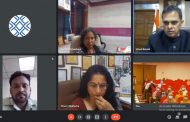KHARTOUM 29 April 2020 – UNICEF welcomes the landmark move by the transitional government to criminalize female genital mutilation/cutting (FGM/C) in Sudan.
The amendment to the Criminal Law Article 141 was endorsed by both the Sovereign and Ministerial Councils on 22 April. All amendments proposed by National Council for Child Welfare (NCCW) in line with UNICEF vision to promote child rights were also endorsed.
This comes following years of persistent and forceful advocacy by all stake holders; the NCCW, women and child advocates, donors including UK aid and the Swedish government, UN agencies, international and national organizations, community-based organizations and community members, especially those who came together and publicly declared to join the ‘Saleema’ movement.
Sudan is considered one of the countries where FGM/C prevalence rate is very high. According to the Multiple Indicator Cluster Surveys (MICS) 2014, the FGM/C rate is 86.6 per cent. There is also evidence of decline among the younger age group 14-0 years from 37 per cent in 2010 to 31.5 in 2014.
“This practice is not only a violation of every girl child’s rights, it is harmful and has serious consequences for a girl’s physical and mental health,” says Abdullah Fadil, UNICEF Representative in Sudan. “This is why governments and communities alike must take immediate action to put an end to this practice. Every girl deserves to be ‘saleema’, he added.
Abandonment is not only about the legal reform, or about legalization or criminalization. We need to work very hard with the communities to help enforce this law. The intention is not to criminalize parents, and we need to exert more effort to raise awareness among the different groups, including midwives, health providers, parents, youth about the amendment and promote acceptance of it, said Abdullah Fadil.
UNICEF is committed to eliminating all forms of FGM/C. The organization’s work focuses on building a protective environment for children that safeguards them from abuse and exploitation.
Note to Editors
The Saleema initiative, launched in 2008 by the National Council of Child Welfare (NCCW) and UNICEF Sudan, supports the protection of girls from genital cutting, particularly in the context of efforts to promote collective abandonment of the practice at community level. Saleema is a word that means whole, healthy in body and mind, unharmed, intact, pristine, and untouched, in a God-given condition. The broad objective of Saleema is to change the way that people talk about female genital cutting by promoting, at the community level, wide usage of new positive terminology to describe the natural bodies of girls and women.
Since the Saleema Initiative began in 2008 the ideal of keeping girls ‘Saleema’ has spread throughout Sudan, and also created interest in neighbouring countries such as Somalia and Egypt. It was then adopted by the African Union Commission as a Continental Initiative to end Female Genital Mutilation in Africa by 2030.
The adoption of the Child Act 2010 was considered as a milestone for the protection of children generally and specifically for children in conflict with the law (offenders). However, the implementation of the Child Act was always challenged with the implementation of the Criminal Act (1991) by judges. The Criminal law 1991 had contradicted the Child Act in different provisions leading to violations of the Child Rights in Sudan.
Article 141 of the amendment to the Criminal Act
Article 141 Female Genital Mutilation
(1) There shall be deemed to commit the offence of female genital mutilation whoever, removed, mutilated the female genitalia by cutting, mutilating or modifying any natural part of it leading to the full or partial lost of its functions, whether it is inside a hospital, health center, dispensary or clinic or other places.
(2) Whoever commits the crime of female genital mutilation shall be punished with 3 years imprisonment and a fine or closing the premises.
The other amendments to the Criminal Act include:
Setting the age of the child at 18 and ending the confusion created in the judicial precedents in applying the Criminal Law and the signs of Puberty.
Increasing the age of Criminal Responsibility from 7 to 12.
Prohibition of death penalty on anyone who did not exceed the age of 18.
Prohibition of corporal punishment.
Community service as an alternative measure to detention for pregnant and lactating women.






